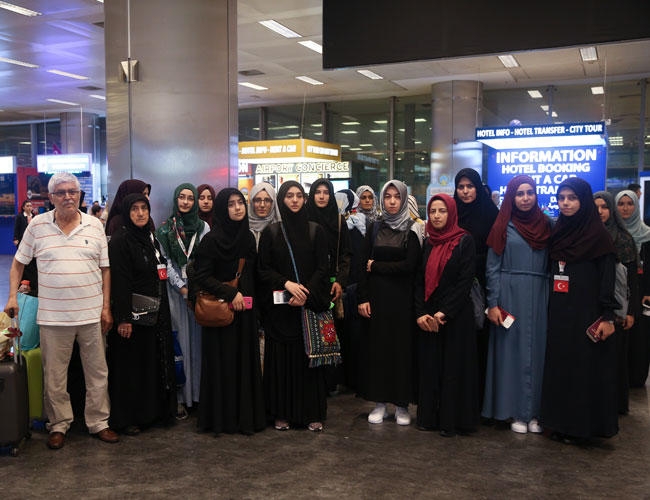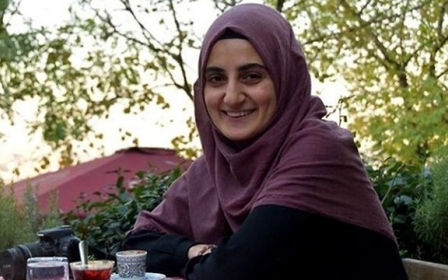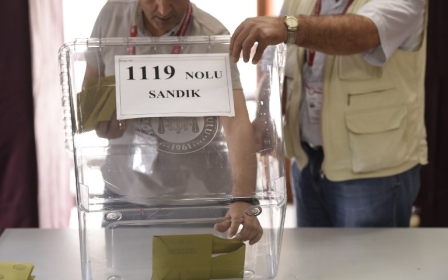Turkish tourist group barred from Israel for having 'forged visas'

Israel has denied entry to a group of Turkish tourists planning to visit the city of Jerusalem, claiming that the group "forged" their visas.
Mustafa Bickioglu, a representative of the Turkey-based Sila Tour company, told Andalou Agency that 72 Turkish citizens were stopped and barred entry at Tel Aviv's Ben Gurion Airport on Sunday.
Bickioglu said that the Sila tour company received a visa letter written in Hebrew, which works as a collective visa for all passengers, from the Israeli consulate in Istanbul.
He confirmed that Israel does not provide separate visas for each passenger to tour companies that bring tourists to Jerusalem.
Israel's Population and Immigration Authority claimed that the visa had been forged, Haaretz reported.
Bickioglu said that 15 passengers were sent back to Istanbul and another 33 are expected to be deported as well, depending on airlines seat availability.
'After questioning some of our friends in the security inquiry room, we were taken to different rooms in groups. Some of the families among us wanted to be in the same room but Israeli police rejected this request.”'
- Sumeyra Sevgulu Haciibrahimoglu, tourist
One of the tourists, Sumeyra Sevgulu Haciibrahimoglu, a 23-year-old master’s student, told Anadolu that Israeli officials had treated them like fugitives.
“After questioning some of our friends in the security inquiry room, we were taken to different rooms in groups. Some of the families among us wanted to be in the same room but Israeli police rejected this request.”
She added that her purpose was to visit the al-Aqsa Mosque in Jerusalem.
Tourism and politics
In May, relations between Israel and Turkey sank to a fresh low, expelling each other’s envoys after 30 March when Israel met largely peaceful mass protests near the fence separating Israel from Gaza with lethal force.
Palestinians began the Great March of Return protests to call for the right of return for refugees forcefully displaced from their towns and villages in 1948 when the state of Israel was created.
At least 136 Palestinians have been killed by Israeli forces mainly through sniper fire and tear gas. There have been no Israeli fatalities.
On 11 June, Israel detained a Turkish tourist, Ebru Ozkan, 27, at Tel Aviv’s Ben Gurion airport as she was leaving the country to return to her homeland.
Israel accused Ozkan, among other charges, of smuggling five bottles of perfume to "raise funds" for the Hamas movement. Ozkan was released last week.
Last December, Israel also arrested three Turkish tourists who protested in the al-Aqsa mosque after Friday prayers against US President Donald Trump's unilateral recognition of Jerusalem as Israel's capital.
Many Turkish tourists have flocked to Jerusalem, an Ottoman-controlled city for almost five centuries, since Trump's announcement. The Ottoman Empire's fingerprints can be seen in the city's architecture, which they built and refurbished - most famously Jerusalem's Old City wall which was built by the Ottoman sultan, Suleiman the Magnificent, in the 16th century.
According to Israel’s Tourism Ministry, around 3.8 million tourists visited the country in 2016. Just 115,000 of them were Muslims and the rest were Jews, Christians or non-religious.
Half of the Muslim tourists were pilgrims, and around 100,000 of them came from Turkey. The rest came from Indonesia and Malaysia, who arrived at Israel's airport or the land borders it controls with Jordan and Egypt.
Each Muslim tourist spends an average of $1,133 on the trip, according to the ministry.
New MEE newsletter: Jerusalem Dispatch
Sign up to get the latest insights and analysis on Israel-Palestine, alongside Turkey Unpacked and other MEE newsletters
Middle East Eye delivers independent and unrivalled coverage and analysis of the Middle East, North Africa and beyond. To learn more about republishing this content and the associated fees, please fill out this form. More about MEE can be found here.




